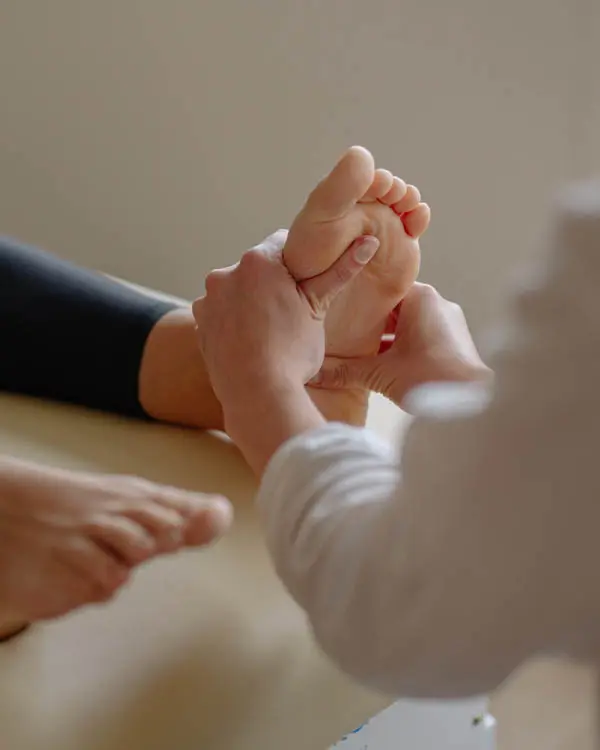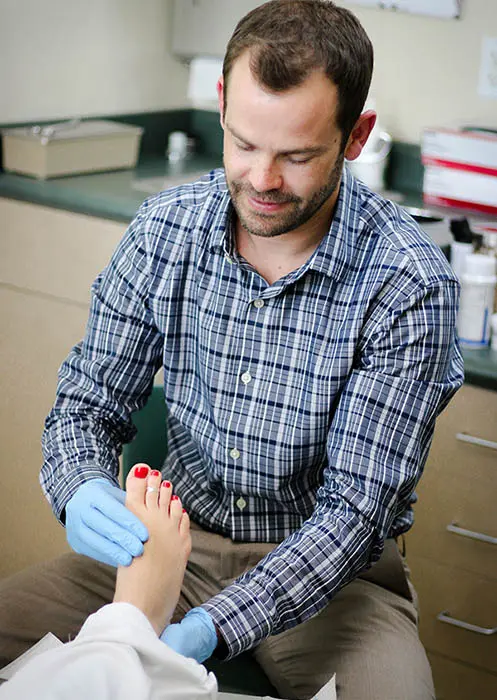Gout Treatment Specialist
Suppose you are experiencing foot or ankle pains. They could either be soft-tissue or joint-related. You know you need a podiatrist but want to avoid seeing the brand-new podiatry resident. You want a podiatrist with experience to help and guide your treatment plan.
Dr. Cameron graduated as a podiatrist in 2013. Before establishing multiple practices in Utah, he completed further training as a foot and ankle reconstructive surgeon. He has amassed countless experiences dealing with foot ailments such as bunions, hammertoes, Achilles tendonitis, plantar fasciitis, and many others. If it’s foot-related, he’s got you covered.
What might be less expected is that he is a perfect candidate to add to your gout treatment team. Since gout is arthritis primarily affecting your feet, podiatrists possess unique skills to help manage your symptoms and provide interventions other doctors cannot. You need your general practitioner, rheumatologist, and other medical professionals to treat the whole picture. Still, a podiatrist can improve your quality of life intrinsically linked to your foot health.
If you are concerned you may have gout, don’t know what’s causing your flares, or need more gout treatment options, you’ve come to the right place.
What Is Gout?
Gout is a form of inflammatory arthritis that can cause very painful flare-ups. These typically affect a single joint at a time, often your big toe, but they can occur all over your body. Unfortunately, there is no cure once you develop gout, so you will have to control it with lifestyle and diet modifications and medications.

Gout Signs and Symptoms
A gout attack or flare occurs suddenly. It can last days to weeks with a period of remission. It can be an intense, throbbing, pins-and-needles type pain similar to nerve pain. Often it will start in your big toe, ankle, or knee. You typically cannot tolerate anything touching the affected joint. You can also experience redness, swelling, stiffness, and heat at the site. You may not be able to move that part of your body. While more uncommon, it’s possible to have a fever and chills with the attack. You can often have your first attack after indulging in fatty red meats and alcohol, such as visiting a Brazilian steakhouse on vacation.
Gout Causes
Gout results from hyperuricemia, a condition where your body has too much uric acid. Uric acid naturally occurs when your body breaks down purines in foods and drinks you’ve consumed. The uric acid crystals build up in your fluids, tissues, and joints all over your body, causing a gout flare. You can have hyperuricemia without gout symptoms, and your body eventually flushes out the crystals. Without the gout pain, your hyperuricemia doesn’t need treatment.
Gout Risk Factors
Men are more prone to gout than women, and gout can run in genetic family lines. Modifiable risk factors include:
- Taking certain medications like diuretics or aspirin
- Poor kidney function, high blood pressure, or congestive heart failure
- Insulin resistance, diabetes, or metabolic syndrome
- Being overweight
- Consuming alcoholic beverages regularly
- Eating or drinking fructose frequently
- A purine-rich diet that includes red meats, seafood, and processed foods
Diagnosing Gout
Gout can appear like other inflammatory diseases, so your medical doctor will diagnose it by taking a medical history, performing a physical exam, and running some diagnostic tests. Getting diagnosed early will prevent complications and mitigate the frequency and intensity of flare-ups.
Doctors will order a blood test to check the uric acid levels, among other measurements. They may want an x-ray or other imaging to assess joint damage or degradation, ruling out other conditions with similar presentations. Lastly, you can have a joint fluid test at the site of your suspected flare. A small needle can grab a sample to check for urate crystals accumulating in the area.

Gout Treatments
Your medical treatment team should include a rheumatologist specializing in treating arthritis like gout. They will manage the pain of your current flare with over-the-counter anti-inflammatory medications, prescription steroids, and colchicine, a drug that helps reduce gout inflammation and pain.
Sometimes, your doctor may recommend steroid injections directly into the affected joint’s space. These intra-articular injections can further reduce the pain and inflammation of your gouty joint. While they provide some of the most immediate relief, they cannot be given frequently due to their risks and side effects.
While managing your current flare, your team will change the management of your other health conditions if they contribute to your gout attacks, such as water pills for your heart or kidney disease. They will likely prescribe a long-term preventative medication to keep uric acid levels low.
Medications such as febuxostat, pegloticase, and allopurinol are preventive gout treatments that prevent flares but can help avoid gout complications. If you have chronic hyperuricemia, you can develop hard uric acid deposits under your skin called tophi.
Like tophi, you can develop kidney stones because the kidneys help excrete the uric acid from your body. While gout can be painful, dealing with a flare concurrently with the pain of kidney stones is unbearable. Beyond medications, your treatment team will recommend lifestyle modifications to help manage your condition.
Gout Treatment Through Diet
When you have gout, the easiest way to control flare-ups besides medication is to eat a diet low in purines. Foods and beverages high in purines can cause higher uric acid levels in your body, triggering a flare. These include:
- Game and red meats, lamb, and pork
- Seafood such as trout, tuna, lobster, shrimp, scallops, mussels, sardines, and anchovies
- Organ and glandular meats, sometimes called sweetbreads, such as pancreas, thymus, liver, and kidneys
- Processed foods, especially those with high fructose, including soda, cereals, ice cream, candy, fast food, and some juices
- Beer, wine, and liquor
Low-purine foods include fruits and vegetables, nuts, grains, specific fish, chicken, eggs in moderation, and either low-fat or non-dairy products. Drinking plenty of water (think eight or more glasses), eating foods high in vitamin C, and having a daily black caffeinated coffee can also help cut uric acid. Be mindful of caffeine consumption as too much can tax your kidneys.
Self-Modification Gout Treatments
Beyond eating a balanced diet low in purines, you can take several other measures to prevent further gout attacks. Focus on staying active: the CDC recommends that individuals with arthritis get at least 150 minutes per week of low-impact, moderate activities. In addition to maintaining your fitness, staying active can prevent other chronic diseases.
Take care to protect your joints. Perform daily activities with proper body mechanics to avoid injuries and extra strain on your joints. Choose low-impact exercises such as walking, swimming, and biking. Give yoga or a water aerobics class a try.
Actively participate in your gout treatments, attending your regular check-ups, refilling and taking your prescriptions as ordered, and seeking options to improve your quality of life, like visiting a podiatrist.
How Foot and Ankle Center Can Help Gout Treatments
Because gout predominantly causes pain in your feet, a podiatrist like Dr. Cameron can play an active role in your gout treatment.
Dr. Cameron’s medical training includes identifying the signs and symptoms of gout, so he can either order the diagnostic tests or refer you out for a swift diagnosis.
In the meantime, he can recommend the modifications you can make at home and over-the-counter medications that will help until you have your official diagnosis.
Dr. Cameron is also a trained foot and ankle surgeon, so he can perform the joint aspiration to look at the fluid for collections of uric acid crystals. If you are diagnosed with gout, Dr. Cameron can also perform intra-articular injection therapy as part of your gout treatment plan.
Dr. Cameron can provide the best foot care during a gout attack. He can provide treatments and advice for conditions such as bunions, calluses, bone spurs, and more that can exacerbate your gout pain.
For example, he can prescribe custom orthotics that can alleviate pressure and provide the support that can lessen the discomfort and pain caused by gout and other foot ailments.
Dr. Cameron has helped countless patients find relief through effective gout treatment plans. Book an appointment today to see how he can help you.

